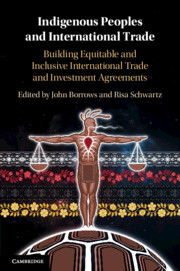 Indigenous Peoples and International Trade
Indigenous Peoples and International Trade Book contents
- Indigenous Peoples and International Trade
- Indigenous Peoples and International Trade
- Copyright page
- Contents
- Contributors
- Foreword
- Acknowledgements
- About the Cover Art
- About the Artist
- Introduction
- Part I Indigenous Peoples and International Trade and Investment
- 1 Indigenous Diversities in International Investment and Trade
- 2 Indigenous Historic Trade in the Western Hemisphere
- 3 Indigenous Peoples of Mexico at the Crossroads: The Human Cost of Continental Trade
- 4 Neocolonialism and the Tension between International Investment Law and Indigenous Peoples: The Latin American Experience
- 5 How the WTO Constructed Inuit and Indigenous Identity in EC-Seal Products
- Part II Building a More Equitable and Inclusive Free Trade Agreement
- Index
5 - How the WTO Constructed Inuit and Indigenous Identity in EC-Seal Products
from Part I - Indigenous Peoples and International Trade and Investment
Published online by Cambridge University Press: 11 June 2020
- Indigenous Peoples and International Trade
- Indigenous Peoples and International Trade
- Copyright page
- Contents
- Contributors
- Foreword
- Acknowledgements
- About the Cover Art
- About the Artist
- Introduction
- Part I Indigenous Peoples and International Trade and Investment
- 1 Indigenous Diversities in International Investment and Trade
- 2 Indigenous Historic Trade in the Western Hemisphere
- 3 Indigenous Peoples of Mexico at the Crossroads: The Human Cost of Continental Trade
- 4 Neocolonialism and the Tension between International Investment Law and Indigenous Peoples: The Latin American Experience
- 5 How the WTO Constructed Inuit and Indigenous Identity in EC-Seal Products
- Part II Building a More Equitable and Inclusive Free Trade Agreement
- Index
Summary
Chapter 5 brings the reader to the far north to examine the importance of self-determination for Inuit in trading disputes on seals and seal products. Michael Fakhri and Madeleine Redfern focus on how the Appellate Body of the World Trade Organization used trade law to construct an Indigenous exemption including a European-imposed determination of Indigenous identity for the purpose of trade in a manner that limits Inuit political and economic options and works against their rights. This chapter emphasizes the importance of Indigenous people continuing to assert their sovereign power and claims for self-determination not just through international law but, more specifically, through international trade law.
Keywords
Information
- Type
- Chapter
- Information
- Indigenous Peoples and International TradeBuilding Equitable and Inclusive International Trade and Investment Agreements, pp. 109 - 130Publisher: Cambridge University PressPrint publication year: 2020
Accessibility standard: Unknown
Why this information is here
This section outlines the accessibility features of this content - including support for screen readers, full keyboard navigation and high-contrast display options. This may not be relevant for you.Accessibility Information
- 1
- Cited by